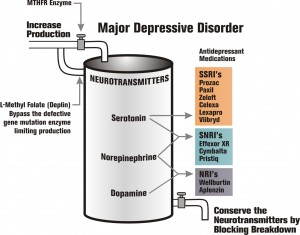With depression, the following picture explains how the different antidepressants help restore the depleted brain neurotransmitters. Think of a tank that holds the 3 major neurotransmitters, serotonin, norepinephrine, and dopamine. If you are deficient from either using up too much or do not make enough, there are only 2 options:
- 1. Conserve what you have already made, or
- 2. Increase production of more neurotransmitter.

1. Conservation: If a person was low in serotonin, they could improve their mood and decrease their anxiety by blocking the breakdown of serotonin by using either Prozac, Paxil, Zoloft, Celexa, Lexapro, or Viibryd. If a person was low in both serotonin and norepinephrine in order to improve their mood, anxiety, and fatigue they could first try either Effexor, Cymbalta, or Pristiq. If a person was low on norepinephrine and dopamine, in order to improve their mood and decrease their fatigue they could first try Wellbutrin.
2. Increase Production: Many people have a genetic mutation of MTHFR (methyl tetrahydrofolate reductase) enzyme which prevents a person from making enough serotonin, norepinephrine, and dopamine. There is a blood test that can detect this genetic defect.
In 2008 a new class of medications called “trimonoamine modulators,” represented by Deplin, (L.-methyl folate), was approved to enhance effectiveness of all antidepressant medications. You can either prove you have a problem by getting the blood test done or simply try Deplin to see if it helps. It works by bypassing the blockage to normal production caused by the genetic mutation and allow your body to have enough “building blocks” to make more of the neurotransmitters. Up to 30% of people who have not achieved “remission” can be significantly helped by adding Deplin, which is a prescription pill even though it is actually considered a “medical food” by the FDA.
